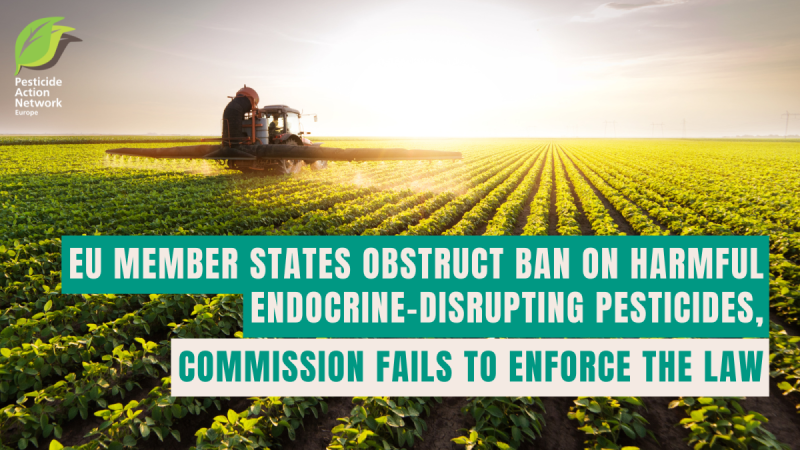Despite clear legal obligations under EU law, several Member States continue to delay and obstruct the ban of harmful endocrine-disrupting pesticides. These substances can be dangerous for human health, and have the potential to affect reproduction, cognition and development, particularly in children. While a few such pesticides have been banned in recent years, many are still on the market. Instead of upholding the law, the European Commission is bowing to political pressure and fails to propose bans on four substances identified by EFSA as harmful to reproduction and development via our hormone system. This is unacceptable, illegal, and puts both public health and the environment at serious risk.
Under the EU Pesticide Regulation (Regulation No 1107/2009), endocrine-disrupting pesticides cannot be approved unless human or environmental exposure is negligible. The European Food Safety Authority (EFSA) has confirmed that buprofezin, cyprodinil, fludioxonil, and fenoxaprop-P-ethyl may disrupt the endocrine system in humans. [1] Buprofezin interferes with thyroid hormones, while the three others interact with sex hormones. None of them meets the 'negligible exposure' requirement, so they must be banned in line with the law.
Considerable delays have already occurred in completing the risk assessment of these endocrine-disrupting substances. Their approvals were initially set to expire in 2017 (cyprodinil), 2018 (fludioxonil and fenoxaprop-P-ethyl), and 2021 (buprofezin), but have been extended multiple times.
Rather than progressing with their long-overdue bans, some Member States are actively pushing to renew approvals, directly contravening the law. They invoke Article 4(7) of the Pesticide Regulation, which permits the 5-year approval of a harmful substance only under exceptional circumstances. These are when the substance is deemed essential to control a serious danger to plant health that cannot be contained by other available means, including non-chemical methods.
However, the Commission itself has acknowledged that renewal under this condition is not feasible. Yet, it lets the substances remain in use while Member States delay formal decisions. [2] Indeed, no proposals for non-renewal have been submitted by the Commission for any of these four substances in recent months. Instead, the Commission is proposing to further extend the approval period of buprofezin until December 2026 during the upcoming Standing Committee of Member States (SCoPAFF) meeting of 9-10 July. [3]
Fludioxonil, the endocrine-disrupting PFAS in fruit and vegetables
The substance most actively opposed to banning by Member States is fludioxonil, which has been under discussion in SCoPAFF since December 2024. Besides its endocrine-disrupting effects, namely altered sexual development and reproductive harm, fludioxonil is also a PFAS. As revealed in our Forbidden Fruit report, fludioxonil is among the most frequently detected ‘candidate for substitution’ active substance in fruit and vegetables in the EU. [4] Fludioxonil is a fungicide authorised in all Member States for use on a broad range of fruit, vegetables, beans, ornamentals and cereals.
Nine Member States are currently blocking efforts to ban this substance and lobbying for its renewal, citing the EU’s Vision for Agriculture and Food. [5] They claim no alternatives exist. This argument reflects an industry-driven narrative that ignores scientific evidence about the availability and viability of alternatives. [6] Eurostat data show that yields have remained stable over time despite bans on harmful pesticides. Moreover, numerous EU-funded projects have demonstrated that Integrated Pest Management (IPM) can reduce pesticide use by 50–80% without affecting yields.
Cyprodinil, an endocrine-disrupting fungicide
Shortly after fludioxonil, cyprodinil also appeared on the agenda. This fungicide has also been identified by EFSA as an endocrine disruptor for human health, with similar harmful effects on reproductive health. Some Member States have again argued that banning both fludioxonil and cyprodinil could impact plant protection because of their similar mode of action. [7] Products containing both substances are authorised for use on fruit and vegetables in Member States. [8]
We have written several times to the Commission, urging it to fulfil its legal obligation to propose the non-renewal of these four substances and to resist pressure from Member States to keep them in the market. [9] The EDC-Free Europe coalition, representing over 70 public interest groups concerned about endocrine-disrupting chemicals and their impact on human health and wildlife, has also raised serious concerns. [10]
The Commission and Member States must act in line with EU law and science, and put the public interest and future generations above short-term private profit.
Learn more about Hormone disrupting pesticides (EDCs)
Notes
[1] Peer review of the pesticide risk assessment of the active substance buprofezin | EFSA
Peer review of the pesticide risk assessment of the active substance cyprodinil | EFSA
Peer review of the pesticide risk assessment of the active substance fenoxaprop‐P‐ethyl | EFSA
Peer review of the pesticide risk assessment of the active substance fludioxonil | EFSA
[6] EU Vision for Agriculture and Food contains unscientific industry narrative on pesticides
[8] Recherche de produits phytopharmaceutiques | Phytoweb (Belgium)
PSM List (Germany)
Consultas Fitosanitarios (Spain)
Switch 62.5 WG - Swedish Chemicals Agency (Sweden)
[9] Call for a swift ban on four known endocrine-disrupting pesticides
Call to propose the non-renewal of fenoxaprop-P-ethyl and fludioxonil
